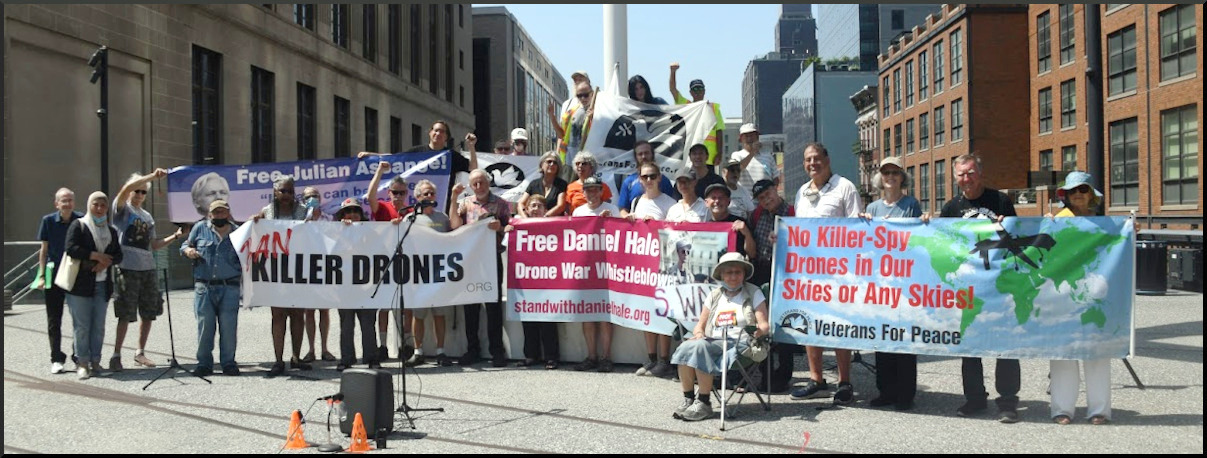UNAC Editor, July 31, 2021
On July 27th, Whistleblower Daniel Hale plead to one count of espionage and was sentenced to 45 months in prison. Five years after ransacking his home, confiscating his computer, phone other materials, the government charged Daniel with 5 counts under the espionage act. Following his plea, his bond was revoked and he was placed in solitary confinement for several months prior to sentencing. They are sending a message: ” if you tell the truth about our crimes, we will come after you and make you pay”. This is what the jailing of Chelsea Manning was about and what the Assange case is about. Whistleblowers have suffered increasingly harsh penalties and long prison sentences since the time of Obama, who put more whistleblowers in prison than all other presidents combined. It is an inversion of justice that Daniel should have to spend any time in prison. The treatment of all these courageous individuals is an outrage.
What was Daniel Hale’s crime? In 2015, he shared some classified documents about the system used by the US military to control a fleet of drones deployed around the globe to surveil and often to kill people. And he shared the truth about the consequences of those strikes for the, more often than not, innocent victims. Daniel shared information that he believed the people of the United States need to know to understand what our government is doing in our name, yet he was prosecuted under a law enacted to punish spies during the first World War. Like Chelsea Manning, John Kiriakou, Reality Winner and numerous other whistleblowers, including Julian Assange, Daniel was charged under the Espionage Act to ensure a maximal penalty.

Between 2009 and 20013, Daniel was deployed to Bagram Air Base in Afghanistan where he participated in the drone program as an intelligence analyst, tracking cell phones associated with men targeted for drone assassination. His experience there was deeply traumatic and left him with severe PTSD. Seeing the men he located targeted and blown to pieces by missile strikes filled him with guilt and horror, as it should any sane person.
Drone warfare frames the experience of the soldier as executioner. In a moving letter to judge O’Grady, who will be sentencing him, Daniel said:
“By the rules of engagement, it may have been permissible for me to have helped to kill those men—whose language I did not speak, customs I did not understand, and crimes I could not identify—in the gruesome manner that I did. Watch them die. But how could it be considered honorable of me to continuously have laid in wait for the next opportunity to kill unsuspecting persons, who, more often than not, are posing no danger to me or any other person at the time.”
Following his discharge from the Airforce in 2013, Daniel immersed himself in antiwar activism. As he was preparing to return to school he was offered a lucrative, high tech desk job as a military contractor, and he took the job. Like many soldiers returning from the United States dirty wars he wavered between guilt and depression, and denial. He once again buried his guilt and confusion until, a few months on, while watching a video of a drone strike with friends at work, in his own words he “felt his heart break into pieces” and his “conscience, once held at bay, came roaring back to life“. So he made the decision to share the information available to him with a reporter he had met during his period of antiwar, anti-drone warfare activism.
Daniel, who has out on bond awaiting sentencing, was called in for a routine check-in on April 28th. When he arrived at the court, he was arrested on a supposed bond violation, imprisoned and placed in solitary confinement to await his sentencing alone, with limited access to books and no mental health support.
The prosecution demanded an extremely high sentence. They say he took the contract job as a plan to acquire the documents he later released to the public. But Daniel’s story of a deep struggle with guilt and denial is typical of soldiers suffering from severe PTSD. Daniel’s final choice to reveal the drone program in all its power and horror was the right one. He is a hero.
The government’s decision to subject Daniel Hale to maximum punishment is the wrong one. It is wrong because the government should be accountable to the people. It is wrong because they should provide support for those who are harmed by their insistence on endless global wars. It is wrong because it denies Daniel’s suffering and the suffering of tens of thousands of military veterans. It is wrong because drone warfare, global policing and targeted assassination are bad policies; unjust, morally reprehensible policies of mechanized murder to rule by fear and mayhem.
Thousands of soldiers return from war suffering from deep trauma. Some drink or use drugs. Some commit violence against family members, other soldiers or even strangers. Some commit suicide. In this context, Daniel’s decision to tell the truth about what the military drone program is and how it operates is a sign of deep strength of character. We cannot abandon Daniel Hale.
In these days of increasing government corruption and concealment, reckless militarism, censorship and propaganda, truth-tellers are precious.
Please join us in the week of solidarity with Daniel Hale, July 28th – August 3rd.
#StandWithDanielHale
#PardonDanielHale
#EndDroneWarfare
#BanKillerDrones

One comment